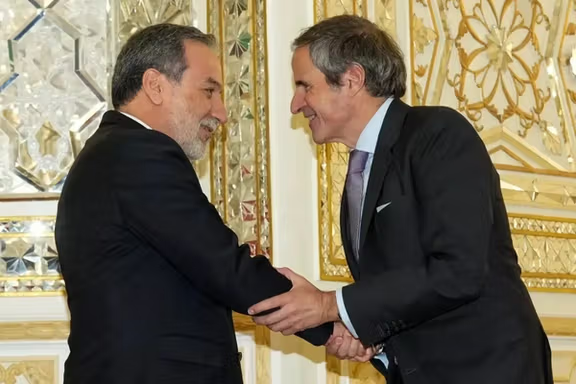'Disaster' born of weakness: Iran hardliners blast IAEA deal

Ultra-hardliners in Tehran blasted a new nuclear deal struck in Cairo with the UN atomic watchdog, accusing negotiators of bypassing parliament and putting national security at risk.

Ultra-hardliners in Tehran blasted a new nuclear deal struck in Cairo with the UN atomic watchdog, accusing negotiators of bypassing parliament and putting national security at risk.
Hardline lawmakers and media outlets say chief negotiator Abbas Araghchi and International Atomic Energy Agency (IAEA) Director General Rafael Grossi have given contradictory accounts of the scope of inspector access to Iranian facilities.
Araghchi insisted the agreement limits inspector access for now to the Bushehr power plant, while calling it a “step in the right direction.” Grossi, by contrast, said it establishes “practical modalities” for inspections covering “all facilities and installations” in Iran.
The ultra-hardline daily Kayhan, funded by the office of Iran’s Supreme Leader, accused negotiators of bypassing parliament’s authority.
“The bitter experience of the JCPOA and the deceitful games of ‘fact sheets’ is being repeated once again—this time with a counterpart that has a record of espionage, servitude to Israel,” a Thursday editorial read.
The paper also claimed the E3 of France, Germany and the United Kingdom delayed activating the snapback mechanism and extended the deadline for reinstating UN sanctions only to prolong psychological pressure on Iran.
No trust for the IAEA
Hamid Rasaei, an ultra-hardline lawmaker, complained that he has not even been able to see the contents of the Cairo agreement.
“What Araghchi says about inspections would only be meaningful if either the text of the agreement was published or the IAEA had formally confirmed it,” he posted on X.
Rasaei also accused Grossi of passing information to Tehran’s foes and warned against granting the Agency access to bombed sites.
“What value does a commitment from an organization that has never condemned US and Israeli military strikes really have?” he asked.
Rasaei and other hardline MPs who recently tabled a “triple-urgency” bill to pull Iran out of the nuclear Non-Proliferation Treaty (NPT) now argue the Cairo agreement tramples on a June bill requiring suspension of cooperation with the IAEA.
Who benefits?
Amirhossein Sabeti, another ultra-hardline lawmaker and adviser to former nuclear negotiator Saeed Jalili, described the Cairo deal bluntly as a “disaster.”
“Araghchi’s deal with Grossi undermines national interests, paves the way for renewed attacks on Iran, and violates Parliament’s legislation,” he wrote on his Telegram channel.
“The return of IAEA spies and inspections of Iran’s nuclear sites serves the Agency’s interests but provides no benefit whatsoever to Iran,” he added, calling the agreement “passive and born of weakness.”
EU, US watching
Meanwhile, European governments have welcomed the Cairo accord but remain cautious.
“It is not enough for Iran to make promises for tomorrow, we need to see evidence from Iran today,” the E3—which triggered the snapback mechanism last month—said in an open letter, noting that key sites remain closed and the timeline for full access is unclear.
The United States on Wednesday urged Iran to take “immediate and concrete action” to meet its nuclear safeguards obligations, warning the IAEA board may need to act if Tehran fails to cooperate.